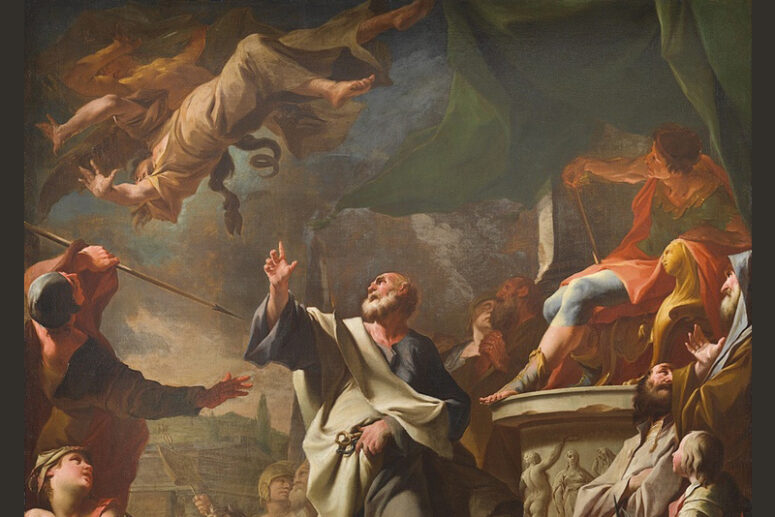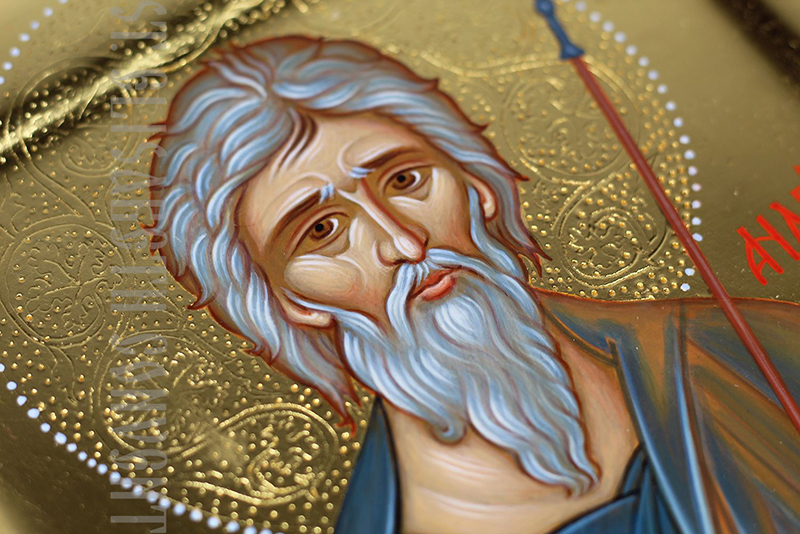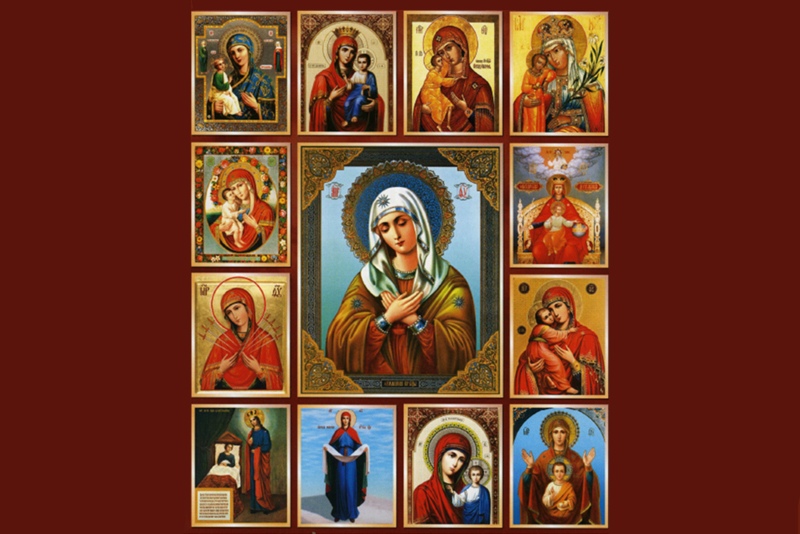
The book of Acts of the Apostles (chapter eight) contains a story about a certain Simon Magus from Samaria, who “amazed the people … practiced witchcraft and claimed to be somebody great” . After the coming of the apostles to Samaria, many people believed and were baptized. Among them was Simon, who, after his baptism, stayed constantly with Philip the Apostle. “When the apostles at Jerusalem heard that Samaria had accepted the word of God, they sent Peter and John to them. The two went down and prayed for them that they might receive the Holy Spirit”. Seeing the descent of the Holy Spirit through the prayers of the apostles, Simon tried to bribe them in order to obtain their power to invoke the Holy Spirit. “But Peter said to him, “May your silver perish with you, because you thought you could obtain God’s gift with money! You have no part or share in this, for your heart is not right before God. Repent therefore of this wickedness of yours, and pray to the Lord that, if possible, the intent of your heart may be forgiven you. For I see that you are in the gall of bitterness and the chains of wickedness.” Simon answered, “Pray for me to the Lord, that nothing of what you have said may happen to me” (Acts 8: 20-24).
This is how the story of Simon ends in the Holy Scriptures, leaving it unclear what happened to him afterwards. There is information about Simon and his later life in the works of some early Christian authors, namely, Justin Martyr and the hieromartyrs Irenaeus of Lyons and Hippolytus of Rome. Besides, St Peter’s struggle with Simon is one of the central narratives in the apocryphal Deeds of Peter, but this source should in no way be considered reliable.
The Hieromartyr Irenaeus of Lyons in his essay Against Heresies testifies that Simon did not repent, but, on the contrary, persisted in studying sorcery trying to surpass the glory of the apostles. Moreover, he openly began to preach that it was he who appeared among the Jews as the Son, in Samaria as the Father and among other nations as the Holy Spirit, thereby becoming the founder of a new sect. In relation to himself, he accepted any exalted title that people used addressing him. The followers of his teachings had idols of Simon in the form of Jupiter, and Simon’s companion Helen, in the form of Minerva. Simon referred to his companion, ransomed by him from a brothel, as the first Thought, the mother of all things, through whom he initially conceived to produce angels and archangels, who then became creators and rulers of the world. According to Simon, each of the angels strove for supreme power, being however unable to cope with running the world, hence the evil present in it. The heresiarch promised his followers liberation from the bonds of “angels” and prophesied about the imminent destruction of the world. St Irenaeus calls Simon the founder of all heresies, which will become his characteristic name for centuries.
In his First Apology for Christianity to the Roman emperor Antoninus Pius, St Justin Martyr wrote that demons inveigled certain people, the first of whom was Simon, into calling themselves gods. According to the same source, Simon used the power of demons to practice his witchcraft in Rome, which made a great impression on the emperor Claudius and the Senate, recognizing him as a god and then honoring him with a statue on the island in the Tiber river, with the inscription Simoni Deo Sancto, “To Simon the Holy God” Besides the Roman Senate, almost everyone in Samaria and some people from other nations recognized Simon as a supreme god. Concluding his story about the heresiarch, Justin asks the emperor to accept his apology so that those who adhere to Simon’s teachings can learn the truth and avoid error. He also asks to destroy the statue of the Magus.
St Hippolytus of Rome, speaking about Simon, mostly retells everything said by Irenaeus and Justin, also adding some significant details. For one thing, Hippolytus says that the whole story of Magus’ companion Helen being the first Thought and the mother of all things was invented by Simon only to justify their union for his followers. In reality, Helen simply charmed and seduced Simon, which became the reason for her ransom. St Hippolytus also testifies that the people seldom perceived Simon as a real teacher, being mostly interested only in his magic. He names the curse pronounced by St Peter (Acts 8:20-23) as the main reason for this deviation, causing Simon to despair, abandon faith and continue to practice magic. St Hippolytus says that Simon met with the apostles more than once (in particular with St Peter), often argued with them and, having convinced himself of his divinity, presented himself to them as Christ. In course of one of such disputes Simon ordered his disciples to dig a grave, bury him alive and then exhume him on the third day, so that, like Christ, he would appear before them resurrected. His followers did as ordered, but Simon did not rise again. Surprisingly, even after such an event, Simon’s teachings still kept some of their followers. For example, according to St Epiphanius of Cyprus, who lived in the fourth century, there were still small groups of Simonians in his time, although they were rapidly dying out.
We can speak of Simon as a liar, a sinner and a heresiarch, but the last event of his life (if it is reliable) clearly demonstrates the sincerity of his convictions and his firm faith in his own divinity. Proceeding from this, he appears as an unhappy person who, according to St Justin, fell under the influence of dark spirits. Hearing the apostles’ sermon and being in communion with them, Simon was baptized and believed, but even after that, having committed a grave sin, he fell. However, such severe consequences could have been avoided if Simon had heeded the words of the apostle and repented. In this sense, Simon is very similar to Judas Iscariot, whereas Judas had communion with the Lord, and Simon with the apostles. Judas committed the gravest sin, which is nowhere close to Simon’s, but he could have also been forgiven if he had repented. But instead, due to a lack of faith, despair, and perhaps obsession, they both voluntarily deprived themselves of their lives, both earthly and eternal. Concluding the above said, it is vitally important to remember the greatness of God’s mercy, the danger of despondency and the saving power of repentance.




